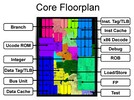AMD GX-210JA

Der AMD GX-210JA ist ein sparsamer Dual-Core-SoC für eingebettete Systeme, der Mitte 2013 vorgestellt wurde. Neben 2 Prozessorkernen mit einer Taktrate von 1,0 GHz (kein Turbo) integriert der 28-Nanometer-Chip auch eine Radeon HD 8180 GPU, einen DDR3-1066-Speichercontroller sowie die Southbridge mit diversen I/O-Ports.
Architektur
Sowohl Kabini (für Notebooks) als auch Temash (Tablets und kompakte Subnotebooks) basieren auf AMDs neuer Jaguar-Architektur, die die Nachfolge der bisherigen Bobcat-Modelle (z.B. E-350) antritt. Laut AMD konnte die Pro-MHz-Leistung um etwa 15 Prozent gesteigert werden, zudem werden nun verschiedene moderne Befehlssatzerweiterungen wie SSE bis Version 4.2, AVX und AES unterstützt. Der feinere 28-Nanometer-Prozess von TSMC erlaubt dabei niedrigere Kernspannungen beziehungsweise höhere Taktraten, zudem werden im Gegensatz zu Bobcat auch Quad-Core-Modelle angeboten.
Performance
Die Taktraten des GX-210JA entsprechen exakt dem A4-1200 aus dem Consumer-Bereich, sodass eine identische Performance zu erwarten ist. Damit liegt die CPU auf dem Niveau des AMD C-60 auf Basis der älteren Bobcat-Architektur.
Grafik
Der SoC integriert eine Radeon HD 8180 GPU, die über 128 Shadereinheiten auf Basis der GCN-Architektur verfügt und mit 225 MHz taktet (kein Turbo). Die Grafikleistung liegt knapp auf Höhe der Intel HD Graphics (Sandy Bridge), wird aber teils von der langsamen CPU ausgebremst. Damit ist die APU nur für einfache 3D-Anwendungen oder Multimedia-Aufgaben geeignet.
Leistungsaufnahme
Die Leistungsaufnahme des gesamten SoCs liegt bei 6 Watt und damit in einem Bereich, der je nach den Umgebungsbedingungen eine passive Kühlung gestattet.
| Serie | AMD |
| Codename | Temash |
| Taktung | 1000 MHz |
| Level 1 Cache | 128 KB |
| Level 2 Cache | 1 MB |
| Anzahl von Kernen / Threads | 2 / 2 |
| Stromverbrauch (TDP = Thermal Design Power) | 6 Watt |
| Herstellungstechnologie | 28 nm |
| Socket | FT3 BGA |
| Features | SSE (1, 2, 3, 3S, 4.1, 4.2, 4A), x86-64, AES, AVX, DDR3-1066 Memory Controller |
| 64 Bit | 64 Bit wird unterstützt |
| Architecture | x86 |
| Vorgestellt am | 23.05.2013 |
Benchmarks
* Smaller numbers mean a higher performance
Noch keine Testberichte für diese CPU gefunden.


 Deutsch
Deutsch English
English Español
Español Français
Français Italiano
Italiano Nederlands
Nederlands Polski
Polski Português
Português Русский
Русский Türkçe
Türkçe Svenska
Svenska Chinese
Chinese Magyar
Magyar